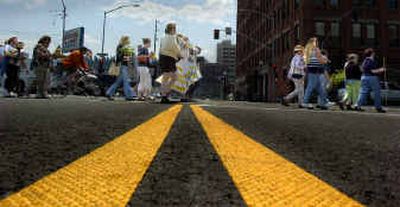Women’s center hits the road

Trish Clayton came in from the harsh reality of street life, from an abyss of pain, violence and drugs.
Twelve years ago, the homeless woman sought help from the Women’s Drop In Center and found herself in the company of people who gave her food and shelter, who didn’t judge the mistakes she made and simply embraced her as one of their own.
“This place saved my life,” she said, her eyes brimming with tears.
Since 1991, the center has become a haven for thousands of women fleeing abusive relationships, coping with loss, suffering from poverty or longing to become whole again.
Like Clayton and the other women who experienced significant life changes, the center made a transition itself Thursday.
It changed its name to the Women’s Hearth and opened the doors to its new home.
The move was celebrated with a procession of more than 40 women who sang songs and carried artwork from the center’s old site at 218 S. Howard to its new location at 920 W. Second Ave.
“This move is the fulfillment of a longtime dream,” said Mary Rathert, a Dominican sister and the center’s director.
It became possible through the efforts and generosity of a number of people and organizations: Sen. Patty Murray, who sought a U.S. Department of Housing and Urban Development appropriation of $223,000; the city of Spokane, which provided a Community Development Block Grant of $135,000; and donations from the Franciscan and Providence Sisters, as well as a number of corporations and religious congregations.
The Women’s Hearth received a total of $625,000 to purchase and renovate the 7,100-square-foot space previously occupied by Mr. Tux.
Some of the women, such as Ginny O’Bryen Edwards, shed tears when they left the old site. That was where she came one year ago to seek refuge from an abusive relationship, she said, and the room in the back became a place to write, share stories and heal.
“I walked in and it was so peaceful,” she recalled. “It helped me grow and change.”
Although saying goodbye to the old place was hard, O’Bryen Edwards joined in the celebration of the women’s new home. As they entered the large space that still smelled of fresh paint, they found their afghans spread on the old couches, the furniture and other familiar objects.
As they stood in a circle around, the women took turns sharing their hopes while lighting a tea candle.
“For all the love that this place brings to all of our lives.”
“For miracles, all the ones that happened and will happen.”
” … that this will continue to be a safe place for all women.”
” … that we will never have to move again.”
In 2003, women from all walks of life paid an average of 1,600 visits a month to the center. While many come to simply gather with others, some seek help from the support groups or receive referrals for housing, mental health or crisis intervention. They also participate in art and writing classes as well as courses that teach computer skills or prepare them for the GED. During their visits, the women focus on every issue that affect their lives – from spirituality and personal growth to fostering healthy relationships, developing self-esteem, coping with loss and healthy living and eating.
More than 30 percent of the women who benefited from the center are homeless, according to the center’s 2003 statistics. Nearly 82 percent of the single women who came in 2003 earned less than $9,192 a year and more than 20 percent were women of color.
Founded in 1991 by Cathy Beckley, a Holy Names sister who wanted to create a safe place for women to gather and help each other to heal, the Women’s Hearth is one of three programs that are part of the Transitions program for women.
“I’m grateful for all the help they’ve given me,” said Clayton, 47. “They’re my family and this place is my home.”